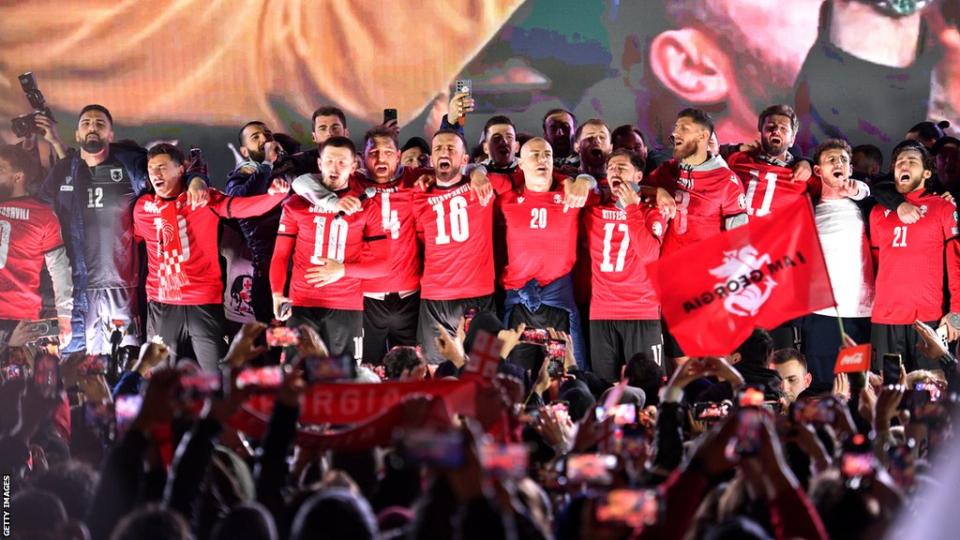Euro 2024: Groups, fixture dates and who are favourites?

The current champions of the Euro tournament, Italy, have been placed in Group B for the upcoming Euro 2024. They will be joined by Spain, Croatia, and Albania.

The international matches for March have concluded and it won't be too much time before the summer arrives and Euro 2024 is here.
Could Gareth Southgate lead the England team to victory and will Steve Clarke's Scottish team make a significant impression in a major tournament?
Passionate supporters might ask themselves these three queries, since elite European clubs compete to establish their status in the international arena.
BBC Sport has already made the draw and revealed the potential paths to victory for each team in Euro 2024. They have listed all the important information about this event.
The complete information for the Euro 2024 draw is available All the details regarding the draw for Euro 2024 have been revealed.
Could England emerge victorious in Euro 2024?
Get ready to learn everything there is to know about Scotland's latest tie game. Prepare to discover every detail surrounding the most recent draw that Scotland achieved.
The guide to the stadiums for Euro 2024 As hosts of Euro 2024, Germany will be showcasing some of their finest and most iconic stadiums. Each stadium has its unique characteristics and history and is sure to provide a fantastic atmosphere for fans and players alike. The Allianz Arena in Munich is one of the most modern stadiums in Europe, featuring a striking exterior made up of luminous panels that change color depending on which team is playing. The Olympiastadion in Berlin is a classic venue that was originally built for the 1936 Olympics. It has since been renovated and modernized, but it still retains its historical charm, including the famous bell that rings when Hertha Berlin score a goal. The RheinEnergieStadion in Cologne is another modern stadium with an impressive capacity of 50,000. It is home to FC Koln and boasts a retractable roof that can be opened or closed in just 15 minutes. Other stadiums that will host matches include the Signal Iduna Park in Dortmund, the Mercedes-Benz Arena in Stuttgart, the Veltins-Arena in Gelsenkirchen, and the Red Bull Arena in Leipzig. All in all, the stadiums chosen for Euro 2024 showcase the best of Germany's sporting infrastructure and cultural heritage, providing a diverse range of venues for fans to choose from. Whether you're a die-hard supporter or just looking to soak up the atmosphere, these stadiums are sure to deliver an unforgettable experience.
When Does The Tournament Start?
Euro 2024 is set to take place in Germany, with the action starting on the 14th of June 2024 at the Allianz Arena, which is where Bayern Munich play their home games. The first match of the tournament will be played between the host team and Scotland.
The event will run for a whole month and come to an end on Sunday, the 14th of July, at the Olympiastadion located in Berlin.
Germany is going to host the tournament for the first time after reunification. The previous occurrence happened in 1988 in West Germany.
Originally, the tickets were available for purchase by anyone from October 3rd to October 26th. However, they were distributed through a random selection process.
The last opportunity for ticket holders to sell any extra tickets they may have is available until April 15.
Uefa is putting up for sale a limited quantity of tickets, which could have obstructed views. These tickets will be available until all the matches are sold out.
Who Are The Top Picks?
Bookmakers currently have England as the top choice with odds of 3/1, with France following closely behind at 7/2. The host nation Germany has odds of 6/1.
Spain has the second-best odds of winning at 7/1, whereas Scotland's chances of winning are much lower at 80/1.
What Are The Categories?
In this group, there are four teams: Germany, Scotland, Hungary, and Switzerland.

The teams competing in Group B are Spain, Croatia, Italy, and Albania.
Cluster C: Slovenia, Denmark, Serbia, England
Group D comprises of Poland, Netherlands, Austria, and France.
Here's another way to say it: These are the countries in Group E for the tournament: Belgium, Slovakia, Romania, and Ukraine.
Group F comprises of four teams, namely Turkey, Georgia, Portugal, and Czech Republic.
Georgia created a new record by qualifying for their inaugural prominent tournament through a penalty shoot-out victory against Greece during their Euro 2024 play-off.
How To Watch?
The United Kingdom's broadcasting of Euro 2024 will be a joint effort between BBC and ITV, replicating the arrangement used for the 2022 World Cup in Qatar and past European Championships.
Exact timetables and the BBC's expert panelists will be announced nearer to the start of the competition due to the busy nature of the preparations.
Where Will England And Scotland Play?
The matches that England will play during the group stage are as follows: On June 16th, they will face Serbia in Gelsenkirchen at 8:00 PM British Summer Time. On June 20th, they will play against Denmark in Frankfurt at 5:00 PM BST. Lastly, on June 25th, they will confront Slovenia in Cologne at 8:00 PM BST.
Check out Scotland's upcoming games during the group stage! On June 14th, they'll be facing off against Germany in Munich at 8pm BST. Then on June 19th, they'll be playing Switzerland in Cologne at the same time. Finally, on June 23rd, Scotland will be taking on Hungary in Stuttgart once again at 8pm BST.
Possible Knockout Opponents?
In case England becomes the leader of Group C, they will encounter one of the teams that achieved third place in either Group D, E, or F during the round of 16.
In case England comes in second place in their group, they will play against the top team from Group A in the final 16.
In case Scotland comes out on top in Group A, they will be up against the team that placed second in Group C. This could be either England, Denmark, Slovenia or Serbia.
If Steve Clarke's team manages to secure the second place, they will have to compete against the second-best team from Group B. This means they might have to face Spain, Albania, Croatia or Italy.
Both teams have the opportunity to move ahead as one of the top four third-placed teams during the group stage.
"Which Teams Are In Form?"
Before the tournament started, there were six teams that had not lost any games during the qualifying stage. These teams were France, England, Portugal, Belgium, Romania, and Hungary.
Portugal is the sole team that succeeded in winning each of their matches, completing the qualification stage with an impressive 36 goals scored and only two goals conceded.
Spain and Scotland have each suffered only one defeat in their respective campaigns, demonstrating their exceptional performances. Meanwhile, Turkey and Austria have also secured their spots in the next stage of the competition as both teams hold equally remarkable records.
Even though every qualifying game was won by Portugal, their team didn't produce the highest goal scorer in these matches. The player with the most goals scored was Romelu Lukaku, who plays for Inter Milan and managed to score 14 goals in eight games for Belgium.
What Stadiums Will We See?
You will catch glimpses of both the Allianz Arena and Olympiastadion during the tournament, but don't forget there are 10 cities that will be hosting games, including Cologne and Dortmund.
Borussia Dortmund's famous 'yellow wall' stadium, Signal Iduna Park, has been chosen to hold games in Groups B, D, and F during the upcoming tournament. The stadium has also been selected as a venue for the crucial last 16 matches as well as the exciting semi-finals.
Below is the complete roster of locations for the competition:
Berlin's Olympiastadion has the ability to accommodate up to 70,000 people.
also known as RheinEnergieStadion, is a famous stadium located in the city of Cologne, Germany. With a seating capacity of 47,000 people, it is one of the largest stadiums in the country. The Cologne Stadium is also referred to as RheinEnergieStadion, and it is a well-known sports venue situated in Cologne, Germany. This stadium has the capability of accommodating up to 47,000 individuals, making it among the biggest stadiums in the nation.
Dortmund: Home of the BVB Stadium with a capacity of 66,000.
is one of the biggest and most impressive venues in the city of Dusseldorf. It's a modern, state-of-the-art facility that offers visitors plenty of amenities and features to enjoy. Whether you're a sports fan, a music lover, or simply looking for a fun night out with your friends or family, the Dusseldorf Arena is definitely worth checking out. One of the things that makes the Dusseldorf Arena so unique is its size. With a capacity of 47,000 people, it's one of the largest indoor venues in the region. This means that you'll never have to worry about finding a good seat or getting lost in the crowd. Additionally, the venue is equipped with a range of advanced technology and sound systems, ensuring that you'll have an unforgettable experience no matter what kind of event you're attending. But the Dusseldorf Arena isn't just about the technology and amenities - it's also a great space for hosting a wide range of events. From massive sporting events and concerts to corporate functions and exhibitions, the venue can accommodate almost any kind of event you can imagine. And with its central location in the heart of the city, it's easily accessible from all parts of Dusseldorf and beyond. Overall, the Dusseldorf Arena is an impressive and versatile venue that's definitely worth a visit. Whether you're looking to catch a game, see your favorite band in concert, or attend a conference or trade show, this iconic venue is sure to exceed your expectations.
Frankfurt: The capacity of Frankfurt Arena is 48,000 people.
Gelsenkirchen is home to the impressive Arena AufSchalke, which can hold up to 50,000 people.
Hamburg boasts the Volksparkstadion Hamburg, which has a seating capacity of 50,000.
Leipzig: A football stadium in Leipzig capable of holding up to 42,000 spectators.
Munich: The Munich Football Arena has a capacity of 67,000 seats.
Stuttgart: The stadium with a seating capacity of 54,000 is called Stuttgart Arena.
Have Any Important Parts Been Left Out?
Erling Haaland, who plays as a forward for Manchester City, and Martin Odegaard, a midfielder for Arsenal, won't be participating in the upcoming competition this summer. This is due to Norway not making it through the qualifying rounds.
The team that was paired with Spain and Scotland in the group did not amass sufficient points to secure an automatic berth, and they are also unable to qualify through play-offs.
Sweden is another significant country that won't participate in Germany after failing to qualify for the first time since 1996.









































